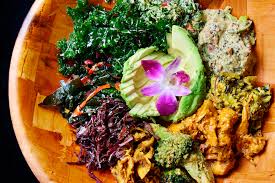More and more of us are taking an active interest in what we eat and are therefore making a conscious decision to avoid some of the overly processed, convenience foods that often masquerade as ‘healthy’ options or ‘light’ choices. Yet, thanks to modern farming techniques, even fresh produce, such as fruit and vegetables no longer provides us with as many of the valuable and minerals as it once did. Spinach is a classic example – once revered for its high iron content and enjoyed by Popeye, this lovely leafy green now contains 60% less iron than it did in 1940.
Which is why many of us are exploring new ways to obtain all of the essential nutrients required for overall physical health and mental wellbeing. For some, the answer lies in eating raw. But what does eating raw actually mean?

What is eating raw?
Raw foodists tend to take the proverb ‘you are what you eat’ very much to heart and strive to make sure that they only put food in its natural state into their bodies. Eating raw therefore involves eating entirely raw, uncooked and unprocessed foods, which can include raw fruits, vegetables, nuts, seeds, eggs, fish, meat, and non-pasteurised/non-homogenised dairy products although many on a raw food diet avoid eating animal products too. As the food is still effectively ‘live’ (and thus retains as many of the beneficial enzymes and minerals as possible), eating raw can offer a number of important health benefits such as:
• Increased levels of energy and feelings of vitality
• Radiant skin
• Improved digestion
• Weight loss
• Strengthened immunity
• Reduce risk of chronic disease
Is there anything else I should know before I start eating raw?
There are a number of health concerns related to eating raw that are simple to address. The three most common are listed below.
1) Does eating raw mean that I am more likely to suffer from nutrient deficiencies?
Whilst eating raw affords all of the positive effects listed above, eating raw foods in isolation can sometimes lead to deficiencies in certain nutrients, the type of which are often also associated with strict vegetarian or vegan diets. Research suggests that those eating raw are most at risk of developing a vitamin B deficiency, and in particular, vitamins B12 and B9. Your raw food diet may also lack sufficient protein, iron and omega-3 fatty acids. However, if you take care to ensure that your raw food is complemented with a range of powerful super foods rich in these essential nutrients, then you should be able to continue eating raw without problems.
2) Will eating raw put me at greater risk of food poisoning?
It’s true that cooking not only destroys valuable nutrients, it also kills harmful bacteria. For ethical reasons, many raw foodists avoid eating meat and dairy products altogether. However, buying high quality organic products and following basic hygiene rules in the kitchen, will ensure that your risk of contracting E.coli, salmonella or any other types of food poisoning is no greater when eating raw.
3) Will eating raw cause unwelcome detox symptoms
When you first begin eating raw you may notice some unpleasant side effects. These mild detox symptoms can range from headaches, nausea and upset stomachs to minor skin rashes. The good news is that they are generally short lived and to some extent can be managed by gradually increasing the percentage of raw foods that you eat.
The post Is eating raw really that healthy? 3 common concerns appeared first on Superfood blog - Healthy, Rawfood Lifestyle.

